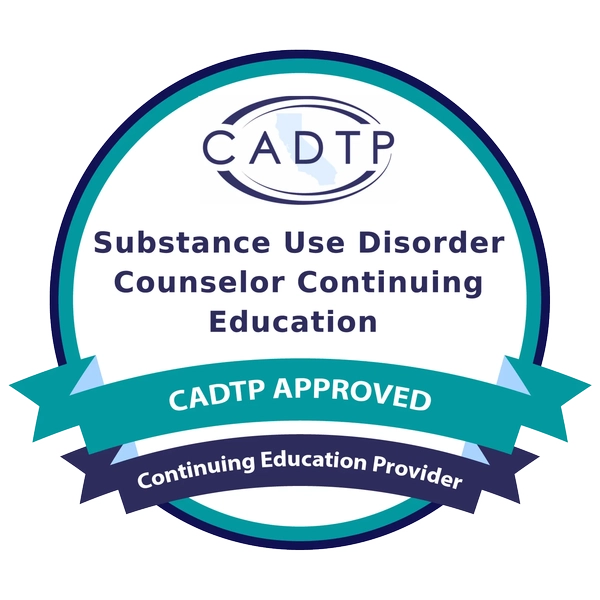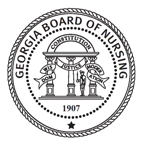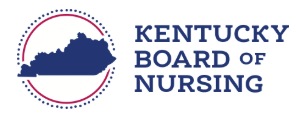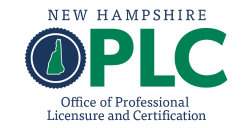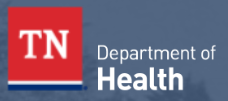We do not respond to voicemails. If we do not answer, we are on the line with another client. Please text or email us. We respond throughout the day or attempt to call again at another time.
Response to Urgent Medical or Psychiatric Situations in Behavioral Health
Understanding the responsibilities of mandated reporting is essential in ensuring the safety and well-being of vulnerable individuals. This course will provide an overview of the legal and ethical requirements for reporting suspected abuse and maltreatment in behavioral health settings. Participants will learn which professionals are required to report, the appropriate procedures for filing a report, and the critical timelines that must be followed to comply with state and federal laws. By the end of this training, professionals will be equipped with the knowledge needed to navigate these responsibilities with confidence and diligence.
This course is for educational purposes only and does not constitute legal, medical, or professional advice. Participants are responsible for applying their own judgment and following all relevant laws, regulations, and professional guidelines. The course provider is not liable for any actions taken based on this material.
This course will award 1 continuing education hour.
Please see the board approval box for course approvals.Course Objectives
Upon successful completion of this course, the learner will be able to:
- Differentiate between psychiatric and medical emergencies in behavioral health settings.
- Identify common medical emergencies, including cardiac events, seizures, respiratory distress, and substance-related crises.
- Recognize acute psychiatric crises, such as suicidal ideation, psychosis, aggressive behavior, and substance-induced conditions.
- Explore crisis de-escalation techniques to prevent escalation and safely manage agitation or aggression.
- Assess suicide and violence risk using standardized tools such as the Columbia-Suicide Severity Rating Scale (C-SSRS).
- Determine when to contact emergency medical services (EMS) or initiate an involuntary psychiatric hold.
- Explore ethical and legal considerations, including HIPAA regulations, duty to protect (Tarasoff Rule), and confidentiality in crisis situations.
- Demonstrate proper documentation and reporting for emergency incidents in compliance with legal standards.
- Coordinate with emergency responders, including law enforcement, EMS, and healthcare teams, to ensure patient safety.
- Apply cultural competency in crisis intervention, recognizing diverse backgrounds and avoiding biases in emergency decision-making.
- Practice crisis response through case studies and real-world scenarios, strengthening confidence and preparedness.
Board Approvals
National Approvals
-
 Association of Social Work Boards (ASWB) (ACE)BaysideCEU.com, #1793, is approved to offer social work continuing education by the Association of Social Work Boards (ASWB) Approved Continuing Education (ACE) program. Organizations, not individual courses, are approved as ACE providers. State and provincial regulatory boards have the final authority to determine whether an individual course may be accepted for continuing education credit. BaysideCEU.com maintains responsibility for this course. ACE provider approval period: 2/4/2026-2/4/2029
Association of Social Work Boards (ASWB) (ACE)BaysideCEU.com, #1793, is approved to offer social work continuing education by the Association of Social Work Boards (ASWB) Approved Continuing Education (ACE) program. Organizations, not individual courses, are approved as ACE providers. State and provincial regulatory boards have the final authority to determine whether an individual course may be accepted for continuing education credit. BaysideCEU.com maintains responsibility for this course. ACE provider approval period: 2/4/2026-2/4/2029 -
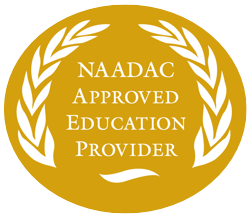 The Association For Addiction Professionals NAADACBayside Continuing Education and Development Provider Number 81892 is a NAADAC Approved Education Provider for educational credits. NAADAC Provider number 81892 is responsible for all aspects of the programming.
The Association For Addiction Professionals NAADACBayside Continuing Education and Development Provider Number 81892 is a NAADAC Approved Education Provider for educational credits. NAADAC Provider number 81892 is responsible for all aspects of the programming. -
 The National Board For Certified Counselors NBCCBaysideCEU has been approved by NBCC as an Approved Continuing Education Provider, ACEP #6098. Programs that do not qualify for NBCC credit are clearly identified. BaysideCEU is solely responsible for all aspects of the programs.
The National Board For Certified Counselors NBCCBaysideCEU has been approved by NBCC as an Approved Continuing Education Provider, ACEP #6098. Programs that do not qualify for NBCC credit are clearly identified. BaysideCEU is solely responsible for all aspects of the programs.
State Approvals
-
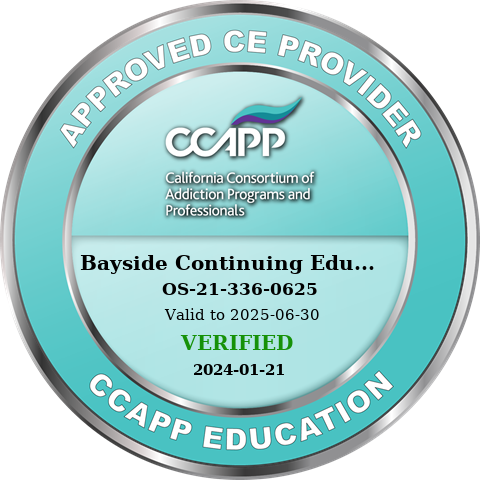 California Consortium of Addiction Programs and Professionals CCAPPProvider approved by CCAPP-EI, Provider # OS-21-336-0623
California Consortium of Addiction Programs and Professionals CCAPPProvider approved by CCAPP-EI, Provider # OS-21-336-0623 -
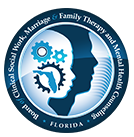 Florida Board of CSW, MFT, MHCFlorida Board of CSW, MFT, MHC Provider Number 726
Florida Board of CSW, MFT, MHCFlorida Board of CSW, MFT, MHC Provider Number 726 -
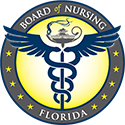 Florida Board of NursingProvider number NCE3508
Florida Board of NursingProvider number NCE3508 -
 Florida Certification BoardProvider 5225-A
Florida Certification BoardProvider 5225-A
Information
- Relevance: This course is designed for mental health professionals, addiction counselors, social workers, nurses, and other healthcare providers who work in behavioral health, substance use treatment, crisis intervention, and emergency response settings. It is particularly beneficial for professionals who interact with individuals experiencing psychiatric distress, medical crises, or co-occurring conditions that require urgent intervention.
- Content Level: Intermediate
- Course Format: This course is offered as a self-paced distance learning format (reading-based online activity)
- System Requirements: This course is offered online. Internet connection required.
- Course Completion Information: To earn continuing education credit, professionals must register and pay the fee for the course. They must read the content and demonstrate understanding by earning a minimum score of 70 percent on testing materials. The certificate of completion will be able to be downloaded after the above is completed. Refunds will be granted upon request with the withdrawal of credit for the course. For questions, concerns, or to request special accommodations, please call 866-863-4225 or email ContactUs@BaysideCEU.com.
- CEBroker Course ID: 1283018
- Credit Hours: 1


